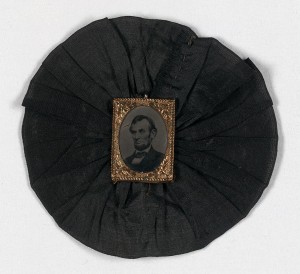My great, great grandfather Union Pvt. Arthur Bull was convalescing in the U.S. General Hospital at Fortress Monroe — 150 years ago this week — when he learned of the assassination of U.S. President Abraham Lincoln. This news could not have been good for his recovery from functional heart disease.

One can only imagine the shock and dismay that traveled through the hospital wards and along the battlefronts as Union soldiers and sailors learned of the 15 April 1865 death of their beloved president.
They had fought for him, most had voted for him, and many affectionately called him “Father Abraham” and “Old Abe.” Now without warning, he was gone — shot by a pro-slavery assassin.
Just days before on 9 April 1865 — after Union forces surrounded the Confederate Army of Northern Virginia — Gen. Robert E. Lee had surrendered to U.S. Lt. Gen. Ulysses S. Grant at Appomattox.
The surrender of Confederate troops spanned three days — first cavalry, then artillery and finally infantry exchanging their weapons for a pass to return home to civilian life.
On 12 April 1865 — four years after the shelling of Fort Sumter by the secessionists — the Confederate infantry stacked their weapons at Appomattox.
Pres. Abraham Lincoln was assassinated two days later.

In a 27 April letter, British antislavery author and actress Fanny Kemble captured the widespread grief and anger shared by so many worldwide on learning the circumstances of Lincoln’s death.
I cannot write I feel too incoherently all the horror & misery of this abominable crime — it is a southern deed — it represents the spirit of slaveholding.
Sentiment among Union Army ranks ranged from tears to anger to vows of vengeance — sentiments my ancestor Arthur Bull no doubt experienced among his fellow convalescents during his hospital stay.
And I have to wonder: What was the reaction in Baltimore — where my Irish great, great grandparents Katherine and William Patrick Dempsey lived in 1865 — when they and other residents learned that assassin John Wilkes Booth was from Maryland?
Bidding farewell
After Lincoln’s death, cannons boomed for a day and a night — every half hour — in his honor. A funeral train swathed in black crepe bore him home from Washington, D.C., to Springfield, Missouri, as throngs of mourners lined the route.
Wearing black ribbons and mourning badges, they stood by the tracks to bid farewell to a president who had seen them through the U.S. Civil War — only to be brutally struck down just as the serious work of post-war Reconstruction was to begin.
The loss was still keenly felt more than a decade later when preeminent African-American abolitionist Frederick Douglass spoke these eloquent words in his Oration in Memory of Abraham Lincoln.
…while a great nation, torn and rent by war, was already beginning to raise to the skies loud anthems of joy at the dawn of peace, it was startled, amazed, and overwhelmed by the crowning crime of slavery — the assassination of Abraham Lincoln. It was a new crime, a pure act of malice. No purpose of the rebellion was to be served by it. It was the simple gratification of a hell-black spirit of revenge. But it has done good after all. It has filled the country with a deeper abhorrence of slavery and a deeper love for the great liberator.
© 2015 Molly Charboneau. All rights reserved.
